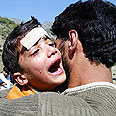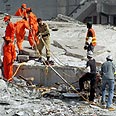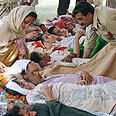


ISLAMABAD - Azad Jammu and Kashmir (AJK), or as western media calls it Pakistani occupied Kashmir (PoK,) was once a scenic beauty, but has turned into a heap of rubble and became ghost town Saturday morning when an earthquake measuring 7.6 on the Richter scale sowed destruction across the region.
In Islamabad, capital of Pakistan, an entire block of Margala Towers collapsed within seconds of the first jolt, trapping dozens of families while in North West Frontier Province and AJK many villages were flattened killing thousands of people.
Pakistan Federal Minister for Kashmir Affairs Faisal Saleh Hayat said: “Out of a population of 2.4 million more than half is affected.”
The Muzaffarabad, capital of AJK, is the scene of flattened houses and mourning victims everywhere. According to some estimates about 2.5 million houses have been destroyed in Azad Kashmir rendering 13-15 million people homeless. Most of the buildings destroyed are government buildings - hospitals, schools, colleges and offices.
There are no food, drinking water, medicines and tents. People fight over limited stocks and spend their nights under the open sky, while some in their vehicles.
‘I kept on shouting for help’
A university student, told me her friend died in front of her eyes along with dozens of other girls in the girls’ hostel of the AJK University.
Fauzia, 25, another university student, who was buried under the rubble of her two-storey house said: “I kept on shouting for help for about an hour. People were going here and there. They would see me and move away without any help.”
Finally her injured sister, Bushra, managed to persuade some relatives to pull Fauzia out. Luckily, Fauzia did not suffer any major injuries.
It’s complete chaos everywhere. Roads to and from the town are closed, except the one linking it with Islamabad through Abbottabad. Some telephone lines are now working, but sporadically. Those with their own vehicles were moving out of the capital through the Abbotabad road but otherwise fuel was not available.
People are angry over what is widely seen as the failure of the government to respond to the disaster. “There’s no food, no electricity, we only have the clothes we’re in. No one has reached them," Ishtiaq Qureshi said.
In Muzaffarabad’ Rizwan Public School about 600 children were in the building when it collapsed. About 124 children were reported to have been rescued by their relatives. Similarly, witnesses said they saw hundreds of dead schoolgirls in the Islamabad School and College in Muzaffarabad and the Soheli Sarkar Girls Higher Secondary School and Girls High School, Narrol.
Buried in bed sheets and blankets
Aid started to trickle down into this area. Pakistan army Tuesday decided to move two more brigades in addition to already working troops and agencies in NWFP and AJK. The torrential rain and hailstorm hamper the relief and rescue efforts. Helicopters that have been making regular flights to bring aid and evacuate the injured from Muzaffarabad were halted by the storm.
Bashir Ahmed, resident of Bagh who works in Islamabad said: “When I heard that the earthquake had caused great destruction across Pakistan particularly in North Frontier region and Azad Kashmir… I rushed to my village. There I saw the whole area flattened by the quake.”
“Twenty-seven of our family died but thank God no one was from my immediate family,” he said.
If aid does not reach this area survivors will face acute health problems. Bodies are emanating a stench. It is feared that if the bodies are not taken out from under the destroyed building they will start decomposing and cause severe environmental hazards.
Bashir said in Bagh many people have lost their senses. They think that D-day has come and gone and have no news of their loved ones. Meanwhile, in the absence of coffins, people have buried their relatives in bed sheets and blankets.















